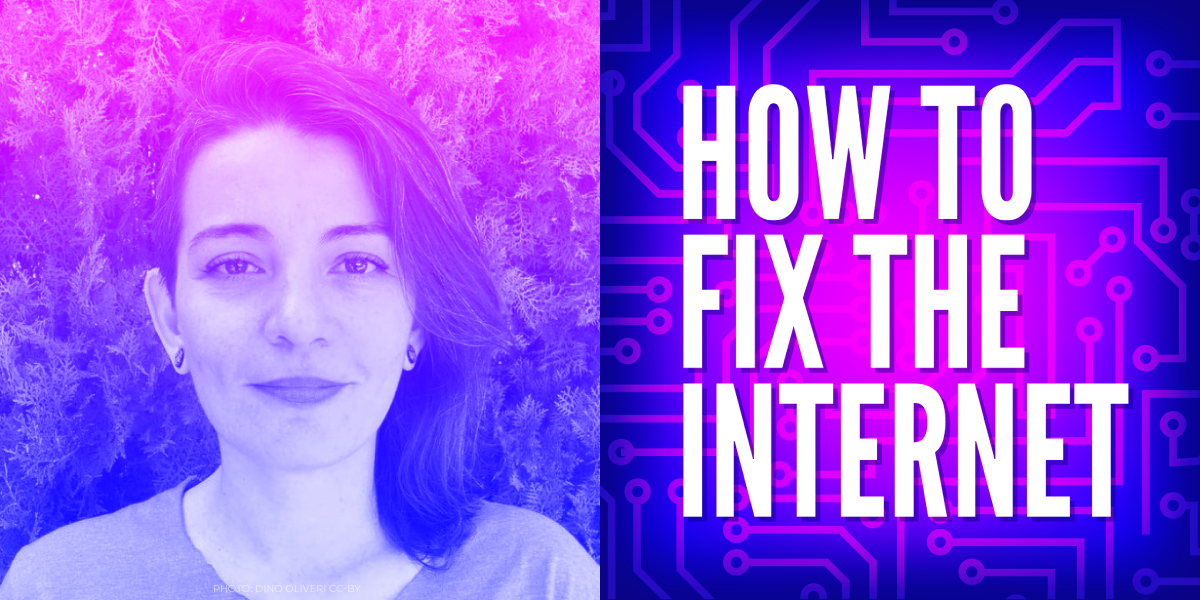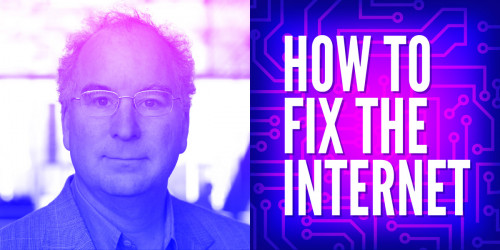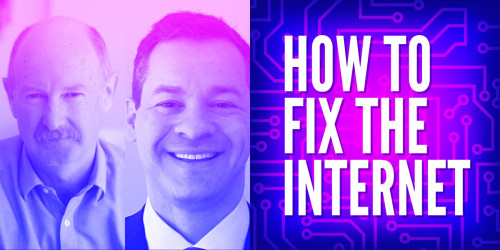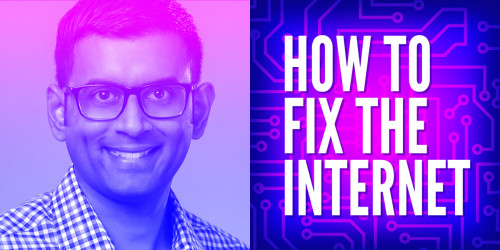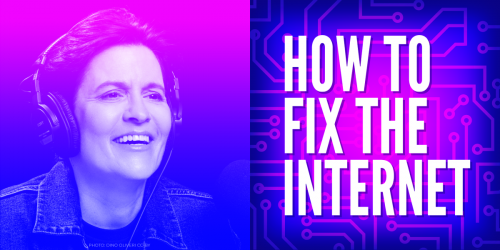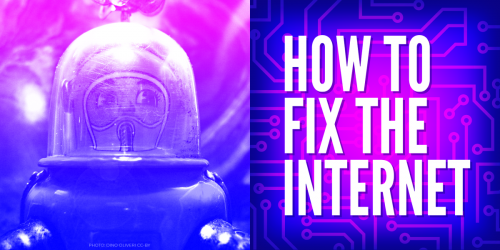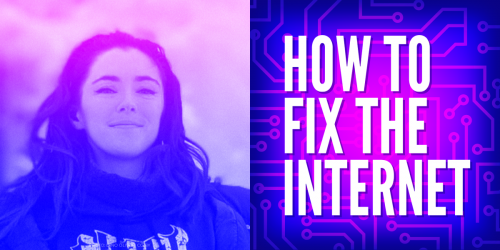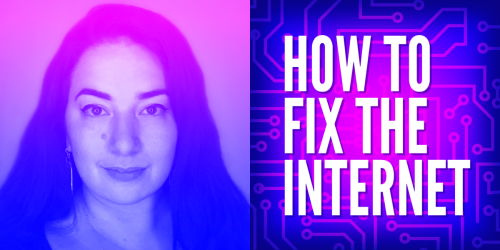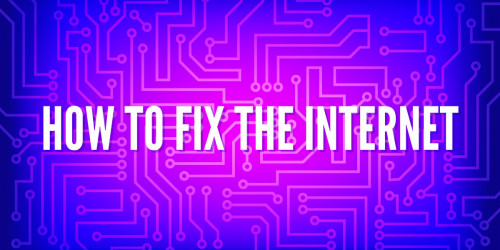Many in Silicon Valley, and in U.S. business at large, seem to believe innovation springs only from competition, a race to build the next big thing first, cheaper, better, best. But what if collaboration and community breeds innovation just as well as adversarial competition?

(You can also find this episode on the Internet Archive and on YouTube.)
Isabela Fernandes believes free, open-source software has helped build the internet, and will be key to improving it for all. As executive director of the Tor Project – the nonprofit behind the decentralized, onion-routing network providing crucial online anonymity to activists and dissidents around the world – she has fought tirelessly for everyone to have private access to an uncensored internet, and Tor has become one of the world's strongest tools for privacy and freedom online.
Fernandes joins EFF’s Cindy Cohn and Jason Kelley to discuss the importance of not just accepting technology as it’s given to us, but collaboratively breaking it, tinkering with it, and rebuilding it together until it becomes the technology that we really need to make our world a better place.
In this episode you’ll learn about:
- How the Tor network protects the anonymity of internet users around the world, and why that’s so important
- Why online privacy is NOT only for “people who have something to hide”
- The importance of making more websites friendly and accessible to Tor and similar systems
- How Tor can actually benefit law enforcement
- How free, open-source software can power economic booms
Isabela Fernandes has been executive director of the Tor Project since 2018; she had been a project manager there since 2015. She also has served since 2023 as a board member of both European Digital Rights – an association of civil and human rights organizations aimed at building a people-centered, democratic society – and The Engine Room, a nonprofit that supports social justice movements to use technology and data in safe, responsible and strategic ways, while actively mitigating the vulnerabilities created by digital systems. Earlier, Fernandes worked as a product manager for Twitter; Latin America project manager for North by South, which offered open-source technology integration to companies using expertise of Latin American free software specialists; as a project manager for Brazil’s President, overseeing migration of the IT department to free software; and as a technical advisor to Brazil’s Ministry of Communications, creating and implementing new features and free-software tools for the National Digital Inclusion Program serving 3,500 communities. She’s a former member of the board of the Calyx Institute, an education and research organization devoted to studying, testing and developing and implementing privacy technology and tools to promote free speech, free expression, civic engagement and privacy rights on the internet and in the mobile telephone industry. And she was a cofounder and longtime volunteer with Indymedia Brazil, an independent journalism collective.
Resources:
- “We Are Making the Tech We Want” panel discussion at The Tech We Want online summit (Oct. 17, 2024)
- Help Net Security: “Delivering privacy in a world of pervasive digital surveillance: Tor Project’s Executive Director speaks out” (Aug. 2, 2023)
- EFF: “EFF Now Has Tor Onions” (Apr. 26, 2023)
- Marco Civil Law of the Internet in Brazil
- EFF’s Tor University Challenge
What do you think of “How to Fix the Internet?” Share your feedback here.
Transcript
ISABELA FERNANDES: If Tor is successful, the internet would be built by its heart, right? Like the elements that Tor carries, which is community, which is decentralization. Instead of having everything focused on a few small companies would be more distributed. I come from the free software world, so I am always excited with, and I have lived at moments.
In my life where I saw I could touch it, I could touch the moment where the source code would be shared and multiple areas of society would benefit from it. Collaboration allows amazing innovation. We are here today because of free software. If it wasn't for that, we would not be here today.
CINDY COHN: That's Isabela Fernandes, head of the Tor Project, describing the beautiful promise of collaboration, community and innovation that is instilled in the free software world – and the important role it plays as we look forward to that better future we’re always talking about on this show.
I'm Cindy Cohn, the executive director of the Electronic Frontier Foundation.
JASON KELLEY: And I'm Jason Kelley, EFF's Activism Director. This is our podcast series, How to Fix the Internet.
CINDY COHN: The idea behind this show is that we're trying to make our digital lives BETTER. You know, a big part of our job at EFF is to envision the ways things can go wrong online-- and then of course jumping into action to help when things then DO go wrong.
But this show is about optimism, hope and solutions – we want to share visions of what it looks like when we start to get it right.
JASON KELLEY: And our guest today is someone whose vision of getting it right is stronger than most.
CINDY COHN: Isabela Fernandes has been an important presence in the security and free software communities for a really long time now.
She's been the executive director at the Tor project since 2018, and before that she was a product manager there. And I'm happy to say that when I was on the board of the Tor project, I was one of the board members that strongly recommended Isa for the executive director role.
She was and continues to be not only a brilliant mind, but a skilled executor. With the Tor Project providing a model for an open source tool that works, is trusted and literally saves lives around the world. We are so thrilled to have her here. Welcome, Isa.
ISABELA FERNANDES: Hi. Thank you.
JASON KELLEY: We're really excited to talk to you and I wanted to start, if I could, with some basics. I think a lot of our audience, you know, has heard of Tor. Maybe they know what the Tor browser is. But some of these things pop up and I think, you know, some people don't know the difference between. A torrent and a tour browser and like what the tour project actually works on. So what is the Tor Project? What are the tools that you’re sort of responsible for creating and maintaining there?
ISABELA FERNANDES: So the Tor Project is actually a non-profit. And our mission is to advance human rights through the technology that we build, right?
So Tor is very similar to a VPN, but much better. We have a decentralized network that is run by volunteers, that whenever you are making a connection to a service or a website, our network will route you through three servers and it's gonna encrypt it every step of the way. And because of this architecture, it's not centralized on anyone or any entity.
It's completely decentralized to thousands of servers around the world. And we also have the Tor browser, which is a fork of Firefox, and what the Tor browser does besides making it easier for you to connect to the to network, it protects your privacy on the device level, so it blocks third party cookies, it also protects you against fingerprinting tracking and other ways that your device identity can leak.
JASON KELLEY: Okay, so just to dig in and make sure I understand, if I'm on a VPN I'm, you know, basically connecting to another server. And all of my connections are going through that. And usually I can, like, pick where they are from a short list of, you know, potential servers in cities and countries.
But with Tor, I don't choose where I'm going or what those three connections are, but it adds that extra layer of protection because three is better than one. But, but why is that? I'm just like, I wonder for the audience who might not know, you know, why three, why not five, or why not two?
ISABELA FERNANDES: Right, so, three, mainly because, so it works like this, right? Like the first server will know who you are because you're connecting to Tor –
JASON KELLEY: Sure, ok.
ISABELA FERNANDES: But it does not know what you are requesting. The middle one does not know who you are and have no idea about what you are requesting, and the exit one, the third one, only knows that someone on the internet is requesting to open a website,
JASON KELLEY: Got it.
ISABELA FERNANDES: So that count is great because if it was only two, that information you, you would still have some way to discover it and to understand where the information is coming from and where it is going.
So three, it is indeed a sweet number for you to have the level of privacy and that we want without building more latency to the connection.
JASON KELLEY: Okay. And then I'm gonna ask one more question. Um. About the technical aspect. Over the last like decade plus, most of the web has become encrypted. The HTTP level has become HTTPS, and that's something that EFF has worked on with our Certbot project, and Let's Encrypt. And if I'm not super familiar with the difference between, you know, how HTTPS is encrypted versus what TOR is doing.
Why do I still need to use Tor? What is it saving? What, how is it protecting my privacy if, if, quote unquote, the web is already encrypted?
ISABELA FERNANDES: Um, let's give this example, right? Like HTTPS would be encrypting your connection to the website. So when you do, you type your username or password, that information is encrypted. However, the server who is watching still would know who you are and where you're coming from. With Tor, you gain that other layer of protection, right? Like, nobody would know who you are and where you like, uh, and what you are requesting except for the website. So it protects you from outside watchers who might be surveilling your connection, also protects you from other tracking mechanisms on the internet.
So the ideal scenario is for you to use both. Right, like it's for you to not only use Tor, but make sure that you're connected to a website that has HTTPS as well.
JASON KELLEY: Wow. Okay. That's really helpful. Thank you so much. I feel like I'm getting tech tech support from the literal executive director of the Tor Project, but I think a lot of people you know that come to us at EFF for privacy or security recommendations really do not understand some of these, you know, somewhat basic things that you're describing about the difference between proxies and encrypted sites and VPNs and Tor, and, um, I think it's just really important for people to know how these different tools work, because they're always, you know, different tools function for different purposes, right.
CINDY COHN: Yeah. And it's, you know, security is hard. It actually requires, I mean, it would be great if there was a one size fits all security. And I think that if you look at all the pieces that Tor’s building, they're, they're moving towards that.
I want us to talk a little bit more about the why of Tor, 'cause we've really outlined the how of Tor, and I wanna give you a chance to kind of debunk one of the arguments that we hear all the time at EFF, which is, you know, why do people need all this security? If you're not doing anything wrong, you know, why should you worry? Um, or is it all just hopeless and shouldn't I just give up?
But let's start with the first one, and I know that you've done a lot of work at Tor trying to really think hard about who needs these tools, who uses these tools in a way that's privacy protective. So I wonder if you could outline a little bit of kind of what you guys know about who uses Tor and why.
ISABELA FERNANDES: There is a spectrum, and I always like to give examples from the two sides of this spectrum. We collect a lot of anonymous stories from users, and let's call this one Brian. So we have Brian. He’s a father and he has two teenage kids at home.
And, uh, you know, as teenagers, they have questions about everything, right? Like about sex, gender, drugs, everything. So he recommends his kids to use Tor when they're searching for those topics on the internet. And sometimes he needs to search some topics himself. You know, like the kids bring a topic that he had no idea what it is about.
So they use Tor to make sure that those searches does not follow those teenage kids for the rest of their lives. Right. Like it's not tagged to them for the rest of their life. So we recommend his kids to use Tor. And then you have on the other side of the spectrum, um, let's call her Carolina.
Carolina is a woman in Uganda. Uh, she's a lesbian. And in Uganda, you can face criminal charge for that. So Carolina just wants to have a normal social online life. And because it's so dangerous in Uganda for her, she really needs to make sure that she's protected and anonymous online when she's interacting with her friends or just looking for topics that is related to her lifestyle. So she used Tor to be safe online, uh, to just have a normal social life on the internet. We did a research, which I thought was very interesting. We put a question on a browser, it was anonymous and anyone could answer.
And we had like a, almost like a 55,000 people answering that question and was how often you use Tor, the Tor browser. And actually more than half of that said that they use one, uh, a few times a day or a few times a week. And that for me says a lot, right? Like it's for those moments where you're like, okay, this, I will want to do on Tor. I don't want the rest of the internet to collect this information and restore it and attach that to my behavior profile.
And that for me, it's what is important, right? Like if people may think that everything is lost and there is no reason to do that. And I think the other way around, I think, uh, it is possible for you to create black spots about your behavior online. And that's what tools like Tor can allow you to do, right? Like you can, uh, create some black spots about you on the internet that protects your privacy.
I think today people do care a lot about their privacy and one example about, which is related to privacy that I always bring to people, it's how dangerous it is to compare the need and the right to be anonymous. With the need to hide something that you don't want others to know or some illegal activity, because anonymity is actually one of the pillars of our democracy. Your vote is anonymous for a reason. So for you to exercise your citizen rights, you need to have privacy.
CINDY COHN: Yep. I think that's exactly right. And I also think we're living in times when things are moving so fast about who's at risk and who's not at risk, that a lot of people are waking up to the fact that just because you might not need privacy in one zone of your life or in one time that we're living in, doesn't mean that that can't change really quickly.
And having the tools available and ready and working is one of the things that we can do – we meaning people in tech – to make sure that as times change, people have the tools that they need to stay safe and to stay protected, and to, to organize, you know, opposition, to organize for change.
Musical transition
CINDY COHN: I think that this is happening a lot, but I'm wondering how you think about helping people reclaim the idea that privacy isn't something we should be ashamed of, that privacy is something that we should be proud of.
I hear you say, and I think that's totally right, it's a pillar of an open and self-governing world. How do you help convince people about that?
ISABELA FERNANDES: Let me step by for a second. Every time, like you might have like heard this from multiple people, right? Like they complain about ads following them, or give an example. Oh, I, I was talking with my friend about bicycles and now all these bicycles ads are showing up, my phone is listening to me.
Right? Like, so I think those are the perfect moment for you to go deeper into the matter of privacy, right? Like, imagine if it was not bicycles, imagine if it was about a government decision that you were talking about, right? That is the moment, right? Like you need to connect with people when they are presenting to you the problem.
So it's, it's fundamental, right? Like that makes super, super easy for someone to understand. But the next step in it is like they ask you how, how do I protect myself. And sometimes I feel like, uh, our work at Tor is not only to create tools. But to make it easier for people to use, it needs to be friendly, it needs to be familiar, right?
Like, uh, that's why the Tor browser is super nice because it's just like any other browser. People hear about Tor and they think it's like, oh, it is this hacker tool that I need to have a special excuse to use. No, it's just like any other browser that you open and you use and you can use on your phone, you can use anywhere.
So it is extremely important to bring awareness when people are identifying the problem, even if it is in an informal conversation or in a more, uh, global conversation, right? Like sometimes those problems arise in global news. Uh, we have multiple, uh, examples of that. Cambridge Analytica was one of it.
And, um, at those, those moments, we need to learn how to connect. But when we connect, we need to also be able to provide solutions that it's easy and familiar to people so they can have hope. They can look at it and they can say, okay, I can control this, right? Like, I can control, I can protect myself, I can protect my privacy.
And those elements come in altogether, right? Like it's not, uh, a one, uh, catchphrase that will make it happen. You need to combine all those elements in the process, right? So it's doesn't seem too hard and people feel empowered to have agency to take action.
CINDY COHN: Yep. I think that's right. So what we try to do in this podcast is kind of flip the script and think about what would the world look like if we got it. All right. So what would the world look like if Tor was immensely successful? What's your vision of the world where we get this right.
ISABELA FERNANDES: In the case of Tor, I think, uh, one thing would be that service and websites, they are friendly to Tor. So if a user is coming to connect to an application, or to a website, that website would know it and would be friendly to it. This is one of the biggest problems right now, right? Like some websites are not friendly to Tor or solutions like Tor. So that would be number one, right?
CINDY COHN: Yep.
ISABELA FERNANDES: So if Tor is successful, we would have an internet or a world with technology, right? Like, to go a little bit the on internet where technology is driven by sharing, by collaboration and the model of it. It's not about the data. And the business model of it would, it can be unique to each case of services, but would not necessarily be the typical one That is the easy one between quotes of let's collect all the data, either to use it for advertise or sell it to, uh, data brokers so we can make some money out of it. Right?
Like, uh, I think that if Tor would be successful, we would have the philosophy of Tor being part of the heart of what it's building, the technology worldwide.
CINDY COHN: Yeah, I think that's great. Um, in some ways, you know, Tor wouldn't need to exist as a separate project because the Tor values would be built into everything. And what I hear there is that that also includes the way Tor has been developed, the open source collaborative, transparent process by which tools were developed would be part of what gets baked in - it's a good vision.
Music transition
JASON KELLEY: Let’s take a quick moment to say thank you to our sponsor.
How to Fix the Internet is supported by The Alfred P. Sloan Foundation’s Program in Public Understanding of Science and Technology. Enriching people’s lives through a keener appreciation of our increasingly technological world and portraying the complex humanity of scientists, engineers, and mathematicians.
We also want to thank EFF members and donors. You are the reason we exist. We will talk a little later in this episode about how important funding from the community is to the work that we do. You can become a member of EFF’s community for just $25.
The more members we have, the more power we have - in statehouses, courthouses, and on the streets. EFF has been fighting for digital rights for decades, and that fight is bigger than ever, so please, if you like what we do, go to eff.org/pod to donate.
And now, back to our conversation with Isabela Fernandes and the impact that free software and the community of people making it has had on her life.
ISABELA FERNANDES: I was raised by free software. Everything I know comes from this, from not only the software itself but the community. So all my skills come from it. So, uh, in the early 2000s, I joined a volunteer network, Colored in the Media was an independent news website, globe-wide. Uh, I built the one for Brazil and we did everything, uh, with free software, right?
Like it was an open publish website. When I explain to people nowadays about it, like you didn't need a username or password to publish your article on that platform, and we have hundreds of those sites around the world, and I did this work for 10 years because I really believe in the democratization of information, and I saw the internet as the root of it. And I saw how powerful that was because it was the beginning of the internet in many parts of the world, here in Brazil was just starting, and not everybody had a connection, and here we were with this powerful tool to democratize, uh, communication in Brazil.
And through that experience, I was invited to work for the federal government in, uh, series of free software initiatives being one of them, in digital inclusion, we would build solutions to communities, um, was a basket of solutions and that was from online stores, uh, they could sell their own products online, uh, to Voiceover IP. At the time it was like there was no cell phones. I'm talking about 2003, uh, like 2004. There was no cell phone.
I arrived to a community one month after they had power for the first time in their life, and I was bringing internet, you know, like, and I'm like, okay, you have internet. What do you want? They didn't have a phone number, a phone line, so I created Voiceover IP. I was like, you can call anywhere in Brazil with this computer. And there was a line with 20 people right away to make phone calls. But that's, we were doing this, we were like going to, uh, the favelas in Brazil and collecting all the teenagers and saying ‘what do you want?’ Like, ‘oh, I wanna record my music.’ And we were recording the music on CDs using everything, free software. Some communities were like, we wanna, uh, document because they have a lot of, uh, folklore stories that is only oral and they wanted to document it. We created a wiki for them to document it. So, education, go to public schools – we did a lot of that with free software. And at the same time, why this was possible, right? Like was because of the culture that was changing. The culture was, okay, we are not gonna use proprietary software anymore. We are not gonna use the money from the country that we barely have to pay for this big, super expensive license.
Instead, we are gonna use this money to invest on the people, to invest on computer science, the students to invest on conventions, free software meetups, uh, to invest on InstallFest. And we start to do that. And we had like a huge technology boom in Brazil from the private sector, like I said, from the government, from universities, everybody was collaborating.
There was a lot of companies being created to provide different types of service or to maintain software, there was a lot of different business being generated out of it as well.
So I could touch it, I could see it. It is possible. We could like we can do it. Right? Like I actually am always very excited when I, and right now I'm seeing a movement again in Brazil, it's not too public yet, but that is a movement like this, with hundreds of organizations debating and building a strategy to recreate that inside of the country.
So it is possible to build a better world with technology, right? Like better versions of technology for us. It's not a mission impossible thing. It is totally possible.
JASON KELLEY: And it's not the distant past really. I mean, sometimes when you talk about it, like I'm, I was alive at the time, but not, you know, not old enough to be involved in that. And it does sometimes sound like a kind of golden era that's lost forever to people. And it's, it's really great to hear that it's, maybe it's something that's cyclical and, or it's something that, you know, we lost for a brief period and we can get back to. How did that movement that's happening now in Brazil, get sort of reignited?
ISABELA FERNANDES: We're bringing some respect from that time. At that time we have, uh, Linux. Linux Install Fest. So you would bring your machine and you would install Linux. We want to combine any, anytime that you have an event that you're talking about the internet, that you're talking about regulation to have install fests – let's say install Mastodon, let's install Signal. Let's have everybody come out of this event and open for the population, right? Like, because sometimes when you offer those options to people. They don't have a network within that option, so they don't tend to stay.
But if you're doing this at an event and you like, let's say let's install Mastodon and everybody can have their account on different Mastadon instance, but we all following each other and I'm seeing the content and I can see it for real, what that means? And I will leave the event already with a network of people that I can follow on MAs on. Same thing. Every time I do a Signal training, I tell people now they're young, solid, let's copy each other's contact. So we have each other on our Signal account, right? Like, so we have a community. So we are thinking about that combination.
Music transition
JASON KELLEY: I wonder how, you know, again, you talk about some of this and I feel so jealous of, you know, being in this movement, I, I've never really been, you know, an engineer, so I'm sort of looking at the free software and open source communities at a distance. How did you end up sort of getting involved in them and, and do you have any advice for other people you know, today that want to be helpful or, um, want to connect with other people to help build the kind of internet you're talking about?
ISABELA FERNANDES: I end up on this out of necessity. When I was a teenager, I hated school, but I love to learn. I got kicked out of, uh, school multiple times until my dad put me in a technical high school to learn computers, but at the same time, uh, in my house, my parents had to work from 7:00 AM to 11:00 PM. So, you know, the strong survive in the house, it was me and my siblings.
And, uh, I could not touch the computer because my older brother would not let me. So I had to write code with a pen and paper and I hate it. And I start to go to my dad’s office to connect to at night when he would leave at 11, I would arrive and stay till 7:00 AM and that's how I start to learn about Linux.
We didn't have money for a license, so the more I wanted to do with the computer, the more I had to go to free software, you know? And like I said, after that, I joined this media network where we did everything. I learned how to build websites. I learned how to build data centers. We had to have security.
We had to build new products for journalists because we wanted to use free software, but sometimes we didn't have everything, or the solutions we had was not good enough, so we had to improve them to edit an audio or a video, right? Like things like that. So I went through this whole phase because I would not accept the technology that the normal, uh, business model wanted to offer me, I didn't accept that as it is, and I thought something else could happen. And like, uh, every time I talk with young people, I tell them this: Don't accept the technology that is being offered to you as it is. Don't accept it. It is possible. The reason we have free software was because people did not accept it, the technology that it was given to them. And I think that's the spirit.
Music transition
CINDY COHN: Thank you so much, Isa, for coming, and sharing your stories with us and your hope. Um, what a, what a hopeful conversation this was.
ISABELA FERNANDES: Thank you so much, Cindy and Jason. It was great to be here. Thank you.
JASON KELLEY: Well now I know how Tor works, which is great because I've been trying to figure that out for years. Um, three steps. I understand why there are three. This makes a lot more sense to me. And I'm honestly just a lot more hopeful than I was, which is always nice. It doesn't happen every time, but I feel like she's describing a future that actually not only is she, she and the Tor folks helping to build, but that other people can be a part of too, which is great.
CINDY COHN: Yeah, I think sometimes people envision privacy tools as the domain of people who are dark and worried and, and wanting to be self-protective all the time. And what was so refreshing about this, and refreshing about the way Isa and Tor operate in the world, is they're working with some pretty serious issues for people, but they're hopeful, they're building a future, they're very positive, and they have a vision of what the world looks like if we build privacy and security into everything. And, and in some ways it was a really light interview about something that protects people from very dangerous situations.
JASON KELLEY: Yeah. Yeah. And she talked a lot about, you know, what got her into free software. For her, it was kind of the necessity of having to write code on paper and not being able to buy software.
But I think we're coming to have that, for some people, that same necessity, again, for a lot of different reasons, you know, the software is bloated, it's enshittified, as Cory would say. Um, it's, you know, often monopolied in some way and, not that these are good things, but if it gets people back to the point she made where you realize that you can build the things yourself, that you don't have to accept the software that you're given and, and the tech that you're given, you can make your own and edit it and things like that. I think that would be a great outcome, and it sounds like that's already happening.
CINDY COHN: I think the other pieces were just, you know, really emphasizing the community, the need for community and how important community is, both in terms of entry into this, but also in the supporting and maintaining and developing of things and in, in how people use Tor. Right. You know, the Tor project operates because of nodes all across the country that volunteer to hold, you know, to carry other people's things. EFF has has done a Tor challenge a few times where we've tried to get more people to run nodes, whether they're in the middle or in the end. But that community is kind of infused in the way Tor works and it's infused in the vision that she has for a better future too. And that's just so consistent with, you know, what we've heard from people over and over again about how we, how we fix the internet.
JASON KELLEY: And that’s our episode for today – thanks so much for joining us.
If you have feedback or suggestions, we'd love to hear from you. Visit EFF dot org slash podcast and click on listener feedback. While you're there, you can become a member, donate, maybe even pick up some merch and just see what's happening in digital rights this week and every week.
Our theme music is by Nat Keefe of BeatMower with Reed Mathis
And How to Fix the Internet is supported by the Alfred P. Sloan Foundation's program in public understanding of science and technology.
We’ll see you next time.
I’m Jason Kelley…
CINDY COHN: And I’m Cindy Cohn.
MUSIC CREDITS: This podcast is licensed creative commons attribution 4.0 international, and includes the following music that is licensed creative commons attribution 3.0 unported by its creators: Recreation by Airtone. Additional beds and alternate theme remixes by Gaetan Harris.



